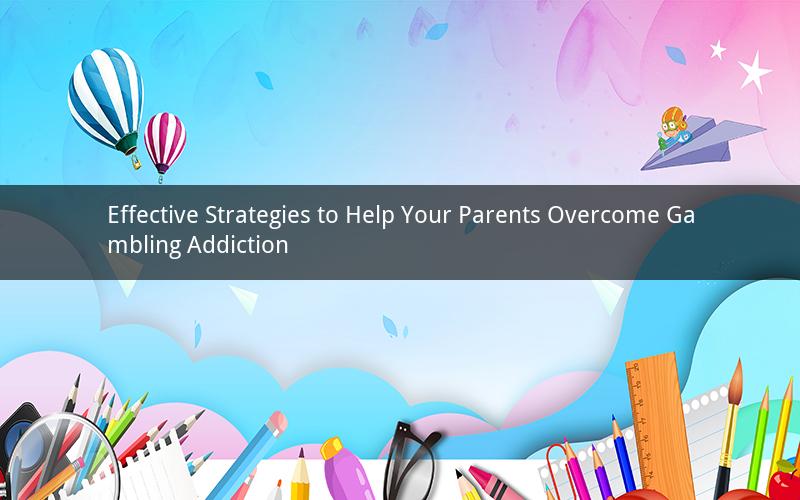
Introduction:
Gambling addiction is a serious issue that can affect individuals of all ages, including parents. If you are concerned about your parents' gambling habits and want to help them stop, this article provides valuable insights and practical strategies to address the problem. By understanding the root causes, identifying warning signs, and implementing effective interventions, you can support your parents in overcoming their gambling addiction.
1. Understanding the Root Causes of Gambling Addiction
The first step in helping your parents overcome their gambling addiction is to understand the underlying factors that contribute to their behavior. Some common reasons for gambling addiction include:
- Financial difficulties: Gambling can provide a temporary escape from financial worries, leading individuals to develop an addiction as a coping mechanism.
- Emotional distress: People may turn to gambling as a way to alleviate feelings of sadness, anxiety, or boredom.
- Social influence: Peer pressure or the desire to fit in with a particular social group can contribute to the development of a gambling addiction.
2. Identifying Warning Signs of Gambling Addiction
Recognizing the warning signs of gambling addiction is crucial in addressing the issue effectively. Here are some common indicators to watch out for:
- Secretive behavior: Your parents may hide their gambling activities or lie about their spending habits.
- Financial problems: They may have difficulty managing household expenses or paying bills on time.
- Emotional changes: They may experience mood swings, irritability, or increased stress levels.
- Social withdrawal: They may isolate themselves from family and friends or neglect their responsibilities.
3. Communicating with Your Parents
Open and honest communication is essential in helping your parents address their gambling addiction. Here are some tips for effective communication:
- Choose a suitable time and place to talk: Find a private and comfortable setting where your parents won't feel threatened or defensive.
- Express your concerns: Clearly explain your worries and how their gambling habits are affecting you and the family.
- Avoid judgment or guilt: Use "I" statements to express your feelings without blaming or shaming your parents.
- Be supportive: Let them know you are there to support them in their journey towards recovery.
4. Encouraging Professional Help
Seeking professional help is a crucial step in overcoming a gambling addiction. Here are some options to consider:
- Therapy: Individual or family therapy can provide a safe space for your parents to explore their emotions and develop healthier coping mechanisms.
- Gamblers Anonymous: This organization offers support groups and resources for individuals struggling with gambling addiction.
- Financial counseling: If your parents are facing financial difficulties, consider seeking help from a financial counselor or credit counselor.
5. Establishing Boundaries and Support Systems
To support your parents in their recovery journey, it is important to establish boundaries and create a supportive environment:
- Set clear expectations: Discuss and agree on boundaries regarding gambling behavior and financial management.
- Offer emotional support: Encourage your parents to share their feelings and concerns, and provide a listening ear.
- Encourage alternative activities: Help your parents find healthy alternatives to gambling, such as hobbies, exercise, or socializing with non-gambling friends.
- Seek support for yourself: Take care of your own well-being by seeking support from friends, family, or support groups.
Conclusion:
Helping your parents overcome their gambling addiction requires understanding the root causes, identifying warning signs, and implementing effective interventions. By communicating openly, seeking professional help, establishing boundaries, and providing support, you can assist your parents in their journey towards recovery. Remember, patience and empathy are key in supporting your loved ones through this challenging process.
Questions and Answers:
1. Q: How can I encourage my parents to seek professional help for their gambling addiction?
A: Start by expressing your concerns and the impact their gambling habits have on the family. Offer to help them find appropriate resources, such as therapists or Gamblers Anonymous groups, and emphasize that seeking help is a sign of strength.
2. Q: What should I do if my parents are secretive about their gambling activities?
A: It is important to maintain open communication and trust. If you suspect your parents are hiding their gambling, try to understand their reasons and express your willingness to support them. Avoid confrontational approaches, as they may lead to defensiveness or denial.
3. Q: Can I help my parents by taking control of their finances?
A: It is crucial to approach this issue with empathy and support. Instead of taking control, consider discussing financial management strategies together. Encourage your parents to seek professional help, such as financial counseling, to address their financial difficulties.
4. Q: How can I support my parents emotionally during their recovery journey?
A: Be a reliable source of emotional support by actively listening, offering empathy, and validating their feelings. Encourage your parents to join support groups or seek therapy to connect with others who are going through similar challenges.
5. Q: What if my parents refuse to acknowledge their gambling addiction?
A: It can be challenging when your parents refuse to acknowledge their problem. In such cases, it may be helpful to seek guidance from a professional, such as a therapist or counselor, who can provide strategies for dealing with denial and resistance. Remember, your role is to support your parents, but you cannot force them to change.